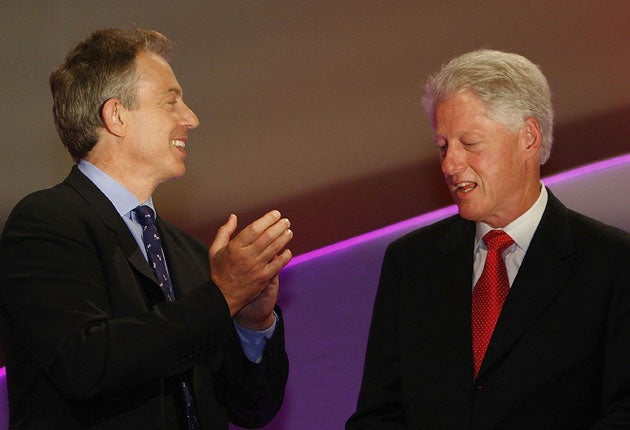Special relationship: the movie
The writer behind <i>Frost/Nixon</i> turns director to film <i>Blair/Clinton</i>

Your support helps us to tell the story
From reproductive rights to climate change to Big Tech, The Independent is on the ground when the story is developing. Whether it's investigating the financials of Elon Musk's pro-Trump PAC or producing our latest documentary, 'The A Word', which shines a light on the American women fighting for reproductive rights, we know how important it is to parse out the facts from the messaging.
At such a critical moment in US history, we need reporters on the ground. Your donation allows us to keep sending journalists to speak to both sides of the story.
The Independent is trusted by Americans across the entire political spectrum. And unlike many other quality news outlets, we choose not to lock Americans out of our reporting and analysis with paywalls. We believe quality journalism should be available to everyone, paid for by those who can afford it.
Your support makes all the difference.As one of Britain's most prolific screenwriters, Peter Morgan has delighted cinema audiences with his depictions of Idi Amin, Richard Nixon, Tony Blair and the Queen.
But after 25 years of writing some of the most memorable movies, Morgan is to swap the relatively safe distance of the screenplay for the director's chair. He will launch his directorial career with The Special Relationship, an HBO film which focuses on the rapport between Mr Blair and Bill Clinton.
The project may test his mettle after revelations that Dennis Quaid and Julianne Moore had been cast as Bill and Hillary Clinton, while Michael Sheen, with whom Morgan has worked extensively in the past, will star as Mr Blair.
The film is due to be given the green light "imminently", with filming expected to begin in just over 10 weeks. A source said Morgan was "very excited" by the prospect.
While his talents as a director are yet to be discovered, Morgan, 45, has certainly proved to have the Midas touch as a writer. He been nominated for an Oscar for The Queen, dramatising the aftermath of the Princess of Wales's death in 1997, and Frost/Nixon, about the shamed American president and his television inquisitor, David Frost. He also co-wrote the screenplay for The Last King of Scotland, based on the Ugandan dictator Idi Amin's regime, and can add The Damned United and The Other Boleyn Girl to his credits.
This latest film is the third part of his "Blair Trilogy", which began with The Deal, looking at relations between Mr Blair and Gordon Brown, followed by The Queen. Such is Morgan's influence as a screenwriter that he has been credited with pioneering his own genre of films, which blend fact with fiction to create dramas that explore the psychologies of compelling public figures.
While the industry ostensibly welcomed Morgan's transition from writer to director, the career move is regarded by some as a gamble that many screenwriters never dare to take – to turn to the coalface of film-making, complete with the tribulations of managing the talents and egos of leading actors.
Nick James, the editor of the British Film Institute's magazine, Sight and Sound, said the transition is rarely encouraged but that there was no reason Morgan should not succeed. "It's always a bit of a leap and screenwriters becoming directors is a move that is rarely encouraged by the industry, but some screenwriters are doing it now, such as Tony Grisoni and Charlie Kaufman, so it's in the air. "You only have to look at the Blair screenplays to realise they are superb pieces of work. His career has been explosive. He came out of nowhere and almost everything he has touched has turned to gold. I'm sure he's been very keenly involved in past films he's worked on and will know what he's doing. You're much more at the sticky end when you're directing, but the experienced actors he has on board will help him through," he said.
Speaking of his plans for the final part of his Blair trilogy, Morgan called Mr Blair the "definitive modern politician" and said this latest film project was a way of dramatising George Bush's years, without actually featuring him in the drama. "Everything that happened pre-9/11 is now Jurassic history and we've completely forgotten it and therefore to explore what happened 10 or 15 years ago is really interesting," he said. "I'm trying to tell in metaphor the story of the Bush years, so I'm hoping that all the questions you'd want me to tackle about Bush and Blair will be tackled in microcosm in Blair/Clinton."

Watch Apple TV+ free for 7 days
New subscribers only. £8.99/mo. after free trial. Plan auto-renews until cancelled

Watch Apple TV+ free for 7 days
New subscribers only. £8.99/mo. after free trial. Plan auto-renews until cancelled
Morgan was initially attracted to the stage and joined a drama group at Leeds University, but gave up acting after a bout of stage fright and set about writing plays. In 1984, he experienced his first real taste of success with his co-written play Gross, which won an award at Edinburgh.
Critics seem to be united in their belief that everything he has touched since has been successful.
Writers turned directors
Charlie Kaufman
The writer of films including Being John Malkovich, which earned an Oscar nomination, Human Nature and Adaptation, made his directorial debut with Syndoche, New York, last year. The film was about a theatre director struggling with his work and the women in his life.
Woody Allen
Allen started out by writing scripts for The Ed Sullivan Show, The Tonight Show and Caesar's Hour. He also wrote short stories and cartoon captions for magazines and became a successful Broadway playwright, before making his name as a director of quirky comedies including Annie Hall and Hannah and her Sisters.
Join our commenting forum
Join thought-provoking conversations, follow other Independent readers and see their replies
Comments